MAMOU SIDIBÉ / “Mamou Sidibé Mixtape”
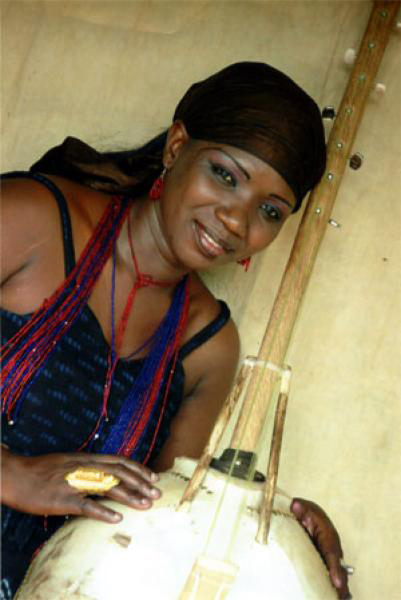 Mamou Sidibé is a vocalist/song writer from the Ganadougou region in southern Mali, West Africa. Ganadougou is near to the famous Wassolu region, which has produced some of the major modern musicians of Mali. In addition to having its own rhythms, Wassoulou is noted as a musical crossroads where diversity and mixture is encouraged rather than shunned, as is more generally the case.
Mamou Sidibé’s father was a professional balafon player and her mother a noted singer. She sang as a youth and eventually moved to Bamako, the capital of Mali to pursue a career in music. For a number of years Mamou was one of the background singers for Ouman Sangere who was from the Wassoulou region of Mali. Ten years after embarking, Mamou released her debut album, Nakan (“Destiny”) in 1999. It was a hit.
Unfortunately, Mamou's success carried a curse.
By the time Mamou had a new album prepared for international release the pirates had plucked the food off the table before anyone had a chance to eat. The pirates broke into the printing plant where the covers were produced, stole two boxes of covers and had their pirated copies in the marketplace within three days of the release of the genuine CDs. Mamou’s record company decided to fight back by completely changing the cover, but that barely slowed the pirates.
In Africa the pirates come at you in two flavors: crow and vulture. Crows are the local pirates who put out cheap reproductions with inferior cover material. Vultures are the international pirates. Their product is nearly identical to the genuine product.
Mamou Sidibé is a vocalist/song writer from the Ganadougou region in southern Mali, West Africa. Ganadougou is near to the famous Wassolu region, which has produced some of the major modern musicians of Mali. In addition to having its own rhythms, Wassoulou is noted as a musical crossroads where diversity and mixture is encouraged rather than shunned, as is more generally the case.
Mamou Sidibé’s father was a professional balafon player and her mother a noted singer. She sang as a youth and eventually moved to Bamako, the capital of Mali to pursue a career in music. For a number of years Mamou was one of the background singers for Ouman Sangere who was from the Wassoulou region of Mali. Ten years after embarking, Mamou released her debut album, Nakan (“Destiny”) in 1999. It was a hit.
Unfortunately, Mamou's success carried a curse.
By the time Mamou had a new album prepared for international release the pirates had plucked the food off the table before anyone had a chance to eat. The pirates broke into the printing plant where the covers were produced, stole two boxes of covers and had their pirated copies in the marketplace within three days of the release of the genuine CDs. Mamou’s record company decided to fight back by completely changing the cover, but that barely slowed the pirates.
In Africa the pirates come at you in two flavors: crow and vulture. Crows are the local pirates who put out cheap reproductions with inferior cover material. Vultures are the international pirates. Their product is nearly identical to the genuine product.
“What is happening now has been around for thirty years,” says Ibrahima Sylla, the Senegalese head of the record company Syllart, and a seasoned producer. “The pirates are in Dubai, in Oman. They make the cassettes and the CDs, and fill up containers which are then shipped to Africa and landed in Tanzania for southern and East Africa, in Angola for central Africa and in Togo for West Africa. Those are the three main hubs.” The pirating network is very well organized. Over the years, the pirates have cut down on the time needed to make and deliver their illegal goods, thus reducing the lifespan of legal albums. “When you produce a major artist such as Koffi Olomide or Salif Keita, you do a first run of 500 to 1,000 albums, and that’s all you’ll sell,” comments Sylla —AFRICA IN THE HANDS OF THE PIRATESIt’s a dirty business, especially because most of the African countries lack the infrastructure to fight back. Of course, not only do the musicians suffer, worst yet musical cultures begin to shrivel up and die out. Between the changing paradigms due to downloads on one side and piracy on the other side, something that no one, even in their most cynical moments, ever imagined could happen. The record business became worst for artists than it already was. Global capitalism strikes again. Meanwhile, we roll with the punches and find ways to continue. In Bamako they call Mamou “Techno Mamou” because her debut album employed computerized beats in combination with acoustic instruments. Nakan was a major success, especially among the youth of Mali.
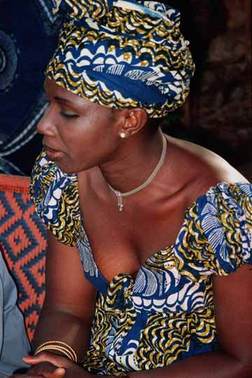 To our ears those tracks probably sound like what we would imagine contemporary African music would sound like but in the context of Malian culture, Mamou was pioneer, especially considered this music was produced by a woman.
On the mixtape the first six selections are from Nakan. Selections seven through twelve are from the recent 2007 album, Djougouya, which sounds even more contemporary than Nakan even though she actually employs more acoustic instruments and less techno manipulation. Nevertheless, both albums represent new developments in popular Malian music.
There is a bonus track included on this mixtape. It is a live recording by Rokia Traore singing the Billie Holiday associated song, “The Man I Love.” Rokia had participated in a Billie Holiday tribute tour on which a diverse ensemble of female vocalists (including Nancy Wilson and Dianne Reeves) sang Billie identified songs.
There are multiple reasons I included the track, not the least of which is that Rokia is the most internationally successful of the young Malian singers.
Although she lives in both Mali and France, traveling back and forth between the two, Rokia is absolutely dedicated to expanding Malian music and expanding the productive capacity of Malian culture. Rokia records in Mali, works with younger artists, puts her full weight behind strengthening the productive capacity and musical infrastructure of Mali.
Much like Techno Mamou, Rokia is waging a difficult struggle against a many-headed opposition. Rokia is alleged to be the first Malian woman to play the guitar in public performance. Rokia has now made the guitar a permanent part of her musical production. She plays both acoustic and electric, including a Gretsch guitar like those traditionally used by blues musicians in the South of the USA.
To our ears those tracks probably sound like what we would imagine contemporary African music would sound like but in the context of Malian culture, Mamou was pioneer, especially considered this music was produced by a woman.
On the mixtape the first six selections are from Nakan. Selections seven through twelve are from the recent 2007 album, Djougouya, which sounds even more contemporary than Nakan even though she actually employs more acoustic instruments and less techno manipulation. Nevertheless, both albums represent new developments in popular Malian music.
There is a bonus track included on this mixtape. It is a live recording by Rokia Traore singing the Billie Holiday associated song, “The Man I Love.” Rokia had participated in a Billie Holiday tribute tour on which a diverse ensemble of female vocalists (including Nancy Wilson and Dianne Reeves) sang Billie identified songs.
There are multiple reasons I included the track, not the least of which is that Rokia is the most internationally successful of the young Malian singers.
Although she lives in both Mali and France, traveling back and forth between the two, Rokia is absolutely dedicated to expanding Malian music and expanding the productive capacity of Malian culture. Rokia records in Mali, works with younger artists, puts her full weight behind strengthening the productive capacity and musical infrastructure of Mali.
Much like Techno Mamou, Rokia is waging a difficult struggle against a many-headed opposition. Rokia is alleged to be the first Malian woman to play the guitar in public performance. Rokia has now made the guitar a permanent part of her musical production. She plays both acoustic and electric, including a Gretsch guitar like those traditionally used by blues musicians in the South of the USA.
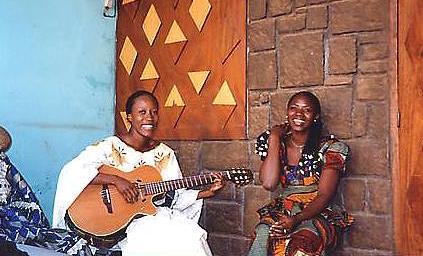 Rokia is an active supporter of Mamou’s music and they work together on projects, as the photograph above illustrates.
One final note: check out some of Mamou’s videos, especially “Mali Mousso,” which is infectious "jump up and dance" kind of music. I find it both interesting and amusing that on the video we see older people doing sexy dance moves that are strictly associated with youth in USA mainstream culture. Go here to see the Mamou videos.
I love the throbbing, low-intensity eroticism of this music. This is hip swinging music. Hip swinging as in the serious and sensuous movement of the pelvis. Rather than the luridness of soft-core porn, this music has the matter-of-factness of healthy eroticism.
Mamou’s calm and gentle voice is simultaneously soothing and arousing—perhaps this Mali-cool is the mother-source of the cool style of singing epitomized by Nat King Cole and, on a contemporary tip, by Sade. Mali seems to have a lock on this kind of flow and for certain Mamou has found the key to combining new technology and centuries old cultural traditions.
Once again, African American poet Mari Evans was precisely on the mark when she says in her poem Black Woman: “look on me and be renewed.” I look forward to more music from the women of Mali and especially from Mamou Sibidé, Rokia Traore and the grand diva Oumou Sangare, whose new album we will feature on BoL shortly.
—Kalamu ya Salaam
Mamou Sidibé Mixtape Playlist
Rokia is an active supporter of Mamou’s music and they work together on projects, as the photograph above illustrates.
One final note: check out some of Mamou’s videos, especially “Mali Mousso,” which is infectious "jump up and dance" kind of music. I find it both interesting and amusing that on the video we see older people doing sexy dance moves that are strictly associated with youth in USA mainstream culture. Go here to see the Mamou videos.
I love the throbbing, low-intensity eroticism of this music. This is hip swinging music. Hip swinging as in the serious and sensuous movement of the pelvis. Rather than the luridness of soft-core porn, this music has the matter-of-factness of healthy eroticism.
Mamou’s calm and gentle voice is simultaneously soothing and arousing—perhaps this Mali-cool is the mother-source of the cool style of singing epitomized by Nat King Cole and, on a contemporary tip, by Sade. Mali seems to have a lock on this kind of flow and for certain Mamou has found the key to combining new technology and centuries old cultural traditions.
Once again, African American poet Mari Evans was precisely on the mark when she says in her poem Black Woman: “look on me and be renewed.” I look forward to more music from the women of Mali and especially from Mamou Sibidé, Rokia Traore and the grand diva Oumou Sangare, whose new album we will feature on BoL shortly.
—Kalamu ya Salaam
Mamou Sidibé Mixtape Playlist
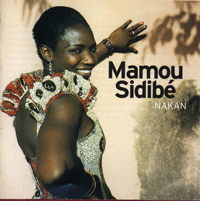 These tracks are from Nakan
01 “Betalamin”
02 “Bassa Kele”
03 “Labandon”
04 “Nakan”
05 “Kafo”
06 “Nimissa”
These tracks are from Nakan
01 “Betalamin”
02 “Bassa Kele”
03 “Labandon”
04 “Nakan”
05 “Kafo”
06 “Nimissa”
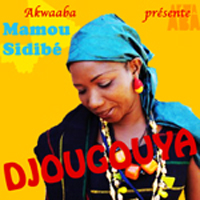 These tracks are from Djougouya
07 “Dambé”
08 “Djougouya”
09 “Donso”
10 “Kanakoroto”
11 “Mary”
12 “Mali Mousso”
These tracks are from Djougouya
07 “Dambé”
08 “Djougouya”
09 “Donso”
10 “Kanakoroto”
11 “Mary”
12 “Mali Mousso”
 13 “The Man I Love (Live)” - Rokia Traore, audio track from Rokia's Myspace site.
13 “The Man I Love (Live)” - Rokia Traore, audio track from Rokia's Myspace site.
This entry was posted on Monday, July 27th, 2009 at 6:17 am and is filed under Contemporary. You can follow any responses to this entry through the RSS 2.0 feed. You can leave a response, or trackback from your own site.
One Response to “MAMOU SIDIBÉ / “Mamou Sidibé Mixtape””
July 29th, 2009 at 3:43 am
It’s great to see this Mamou Sidibe mixtape up!
We here at Akwaaba Music are releasing her third album, Djougouya. It is the first legit release outside of Mali, where the album first came out in 2007. 50% of net revenue from album sales go straight back to Mamou in Mali, so if you like her music, support hMamou Sidibe!
Leave a Reply
| top |